Clemson Assistant Professor Ryann Rose Cartor always liked math, but it wasn’t until she took a business calculus class in her first semester in college that she knew just how much.
“I took the class for fun, and I realized I was having a blast and doing great in a class. Other people were having much less fun,” said Cartor, who went into college as an undeclared major and thought of pursuing something in the sociology or criminal justice field.
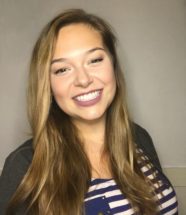
“I think a lot of times females, specifically, almost feel like they need permission to think that they’re good at math. For so long, females were told that guys are better at math and science and girls are better at language arts-type things,” she continued. “Fortunately, my parents and my teachers told me that wasn’t the case, that I could learn anything.”
Cartor is telling Clemson students the same thing.
She is one of four new women assistant professors hired by the School of Mathematical and Statistical Sciences (SMSS) in the past two years, boosting the number of women with tenure or on the tenure track to 11. SMSS has 47 tenured or tenure-track faculty. Of the School’s past 10 tenure-track faculty hires, five are women.
“The hirings are significant for two reasons,” said Kevin James, founding director of SMSS. “Number one, we’re moving toward the gender diversity that we should have. Second, it puts us among leaders nationwide as far as having gender diversity among recent faculty hires.”
There are excellent women mathematicians out there, and Clemson is going to find those excellent mathematicians. That will help create more excellent women mathematicians.
ryann rose cartor, assistant professor in the School of Mathematical and Statistical Sciences
Traditionally, too few women have pursued careers in the mathematical sciences.
Lag in numbers
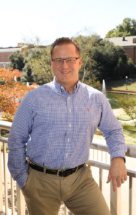
According to the National Girls Collaborative Project, an organization that encourages girls to pursue careers in science and math, women earn 57 percent of bachelor’s degrees in all fields nationwide, but just 42 percent of the degrees in mathematics. Women earned 43 percent of mathematics and statistics master’s degrees, but the percentage fell to 28 percent for doctorates. Women filled 25 percent of new postdoctoral positions.
Nationwide, 32 percent of full-time math faculty in higher education are women. In doctorate math programs, women comprise 24 percent of the faculty. Eleven percent of full professors at Ph.D. granting institutions are women.
At Clemson, each one of the School’s hiring committees has a diversity advocate to ensure that applicants who are women or in underrepresented groups receive careful consideration, James said. However, that doesn’t guarantee a woman will get the job.
“These are excellent faculty members who happen to be women,” he said.
Interdisciplinary research
Part of the School’s strategic plan is to build more interdisciplinary research.
“We want to do more interdisciplinary research. We want to do more research that’s aimed at helping other sciences, particularly biology and medicine,” James said. “We don’t want to hire only that, but we want to take a step in that direction.”
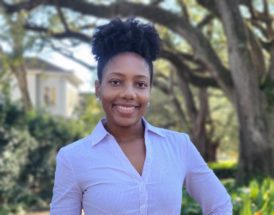
Keisha Cook, an assistant professor who started at Clemson in August 2021, fits that bill. Her primary research area is applied mathematics and computational biology, specifically stochastic processes, probability and mathematical modeling. On the science side, Cook studies the transport of organelles in live cells. Mathematically, she simulates intracellular processes and develops methodologies to statistically analyze and infer the underlying properties that influence their transport.
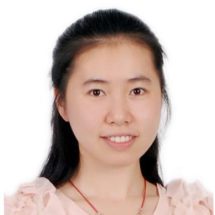
Xinyi Li joined the Clemson faculty in 2020 after completing a postdoctoral fellowship at the Statistical and Applied Mathematical Sciences Institute and the University of North Carolina at Chapel Hill. She focuses on precision medicine, functional data analysis, nonparametric regression, and sparse learning with statistical genetics, neuroimaging, and public health applications. Some of Li’s research involves examining visual images of human brains and looking for anomalies that could correlate to Alzheimer’s disease, the sixth-leading cause of death among adults in the U.S.
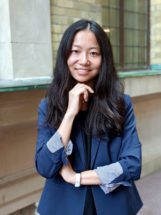
Cheng Guo, who joined the School’s faculty in the fall, specializes in operations research, particularly optimization. She works on models and algorithms that address non-convexities in energy markets and power systems. Guo is interested in developing mathematical models that consider uncertainties in power systems. Such uncertainties might come from integrating renewable energy, extreme weather, and demand spikes. She hopes that her research will help building greener and more stable power grids.
Cartor’s research focuses on post-quantum cryptography, the science of protecting information and ensuring secure communications in the era of quantum computing by updating existing mathematical-based algorithms. Algorithms used to keep data safe on classic computers rely on difficult-to-solve mathematical problems. But quantum computers will break those mathematics-based systems in moments.
Mentors matter
While the four women are pursuing research in different areas of mathematics and statistics, they all agree on one thing — the role mentors play in increasing the number of women in those fields.
“Students succeed and become inspired to pursue certain careers when they see and can learn from those in the field that look like themselves,” Cook said.
Cartor said, “There are excellent women mathematicians out there, and Clemson is going to find those excellent women mathematicians. That will help create more excellent women mathematicians.”
The College of Science pursues excellence in scientific discovery, learning and engagement that is both locally relevant and globally impactful. The life, physical and mathematical sciences converge to tackle some of tomorrow’s scientific challenges, and our faculty are preparing the next generation of leading scientists. The College of Science offers high-impact transformational experiences such as research, internships and study abroad to help prepare our graduates for top industries, graduate programs and health professions. clemson.edu/science
Get in touch and we will connect you with the author or another expert.
Or email us at news@clemson.edu

